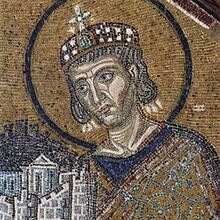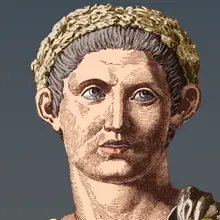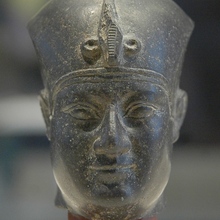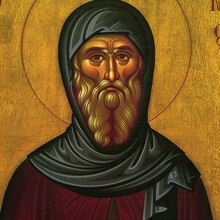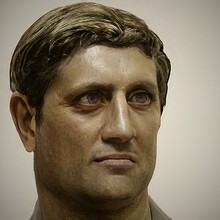Euclid was a Greek mathematician, often referred to as the "Father of Geometry". His most famous work is the book "Elements", which is a comprehensive treatise on mathematics. Euclid's work laid the foundation for modern geometry and his principles and theorems are still taught and used today. He made significant contributions to the fields of number theory, algebra, and mathematical proofs. Euclid's work had a profound impact on the development of mathematics and his influence can be seen in the work of later mathematicians such as Isaac Newton and Albert Einstein.Euclid is often referred to as 'Euclid of Alexandria' to differentiate him from the earlier philosopher Euclid of Megara, a pupil of Socrates included in dialogues of Plato with whom he was historically conflated.[4][14] Valerius Maximus, the 1st century AD Roman compiler of anecdotes, mistakenly substituted Euclid's name for Eudoxus (4th century BC) as the mathematician to whom Plato sent those asking how to double the cube.[26] Perhaps on the basis of this mention of a mathematical Euclid roughly a century early, Euclid became mixed up with Euclid of Megara in medieval Byzantine sources (now lost),[27] eventually leading Euclid the mathematician to be ascribed details of both men's biographies and described as Megarensis (lit. 'of Megara').[4][28] The Byzantine scholar Theodore Metochites (c. 1300) explicitly conflated the two Euclids, as did printer Erhard Ratdolt's 1482 editio princeps of Campanus of Novara's Latin translation of the Elements.[27] After the mathematician Bartolomeo Zamberti [fr; de] appended most of the extant biographical fragments about either Euclid to the preface of his 1505 translation of the Elements, subsequent publications passed on this identification.[27] Later Renaissance scholars, particularly Peter Ramus, reevaluated this claim, proving it false via issues in chronology and contradiction in early sources.[27]
Medieval Arabic sources give vast amounts of information concerning Euclid's life, but are completely unverifiable.[4] Most scholars consider them of dubious authenticity;[8] Heath in particular contends that the fictionalization was done to strengthen the connection between a revered mathematician and the Arab world.[17] There are also numerous anecdotal stories concerning to Euclid, all of uncertain historicity, which "picture him as a kindly and gentle old man".[29] The best known of these is Proclus' story about Ptolemy asking Euclid if there was a quicker path to learning geometry than reading his Elements, which Euclid replied with "there is no royal road to geometry".[29] This anecdote is questionable since a very similar interaction between Menaechmus and Alexander the Great is recorded from Stobaeus.[30] Both the accounts were written in the 5th century AD, neither indicate their source, and neither story appears in ancient Greek literature.[31]
Any firm dating of Euclid's activity c. 300 BC is called into question by a lack of contemporary references.[4] The earliest original reference to Euclid is in Apollonius' prefatory letter to the Conics (early 2nd century BC): "The third book of the Conics contains many astonishing theorems that are useful for both the syntheses and the determinations of number of solutions of solid loci. Most of these, and the finest of them, are novel. And when we discovered them we realized that Euclid had not made the synthesis of the locus on three and four lines but only an accidental fragment of it, and even that was not felicitously done."[26] The Elements is speculated to have been at least partly in circulation by the 3rd century BC, as Archimedes and Apollonius take several of its propositions for granted;[4] however, Archimedes employs an older variant of the theory of proportions than the one found in the Elements.[8] The oldest physical copies of material included in the Elements, dating from roughly 100 AD, can be found on papyrus fragments unearthed in an ancient rubbish heap from Oxyrhynchus, Roman Egypt. The oldest extant direct citations to the Elements in works whose dates are firmly known are not until the 2nd century AD, by Galen and Alexander of Aphrodisias; by this time it was a standard school text.[26] Some ancient Greek mathematicians mention Euclid by name, but he is usually referred to as "ὁ στοιχειώτης" ("the author of Elements").[32] In the Middle Ages, some scholars contended Euclid was not a historical personage and that his name arose from a corruption of Greek mathematical terms.[




